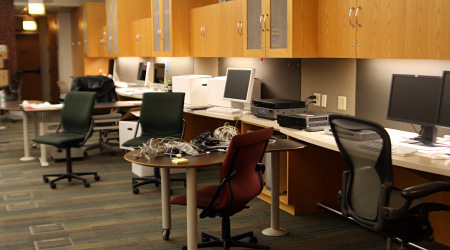Financial Costs Of Starting A Small Business

The amount of financing needed to start a small business will depend on what type of business you're planning. Some key aspects to consider will be if it is a product or service based business. Do you need to rent a space or can you operate out of your home? Do you have a network of friends and family or the ability to obtain a loan? All of this analysis is done in the initial business plan which includes revenue projections and an expected profitability date as well as debt load and planning for unexpected expenses. Below are some key considerations when evaluating financial costs for your small business.
Leasing Operating Space
Ideally every new small business can be started out of the comfort of your home or garage. For some businesses like consulting, bookkeeping, photography and day care this is possible. Others however may require leasing a small space in a strip mall or a retail space like a commercial kitchen or office complex. Office space usually ranges anywhere from $500-$1500 per month and a few hundred dollars for utilities. If it is a service business there may not be a need to move out of the home but most other endeavors, especially those which grow quickly, often have to relocate in 6 to 12 months.
Acquiring Inventory
A retail business must consider inventory expense as part of the monthly operating budget. Purchasing supplies or product from wholesalers or form the manufacturer will often need to be paid for in advance. Where most small businesses get caught financially is juggling their current financial obligations with anticipated or delayed revenues. Managing cash flow means having enough available funds to pay your obligations as revenues, as they sometimes do, trickle in. Try to adopt a "Just In Time" model when it comes to inventory or manufacturing. This means you only pay for product when you already have the sale.
Purchasing Office Equipment
Capital equipment used in manufacturing or office equipment for daily activities will be necessary just to operate a small business., Necessities like a fax machine, printer, computer and telephone system should already be accounted for in your budget. Completely list all expected and possibly unexpected equipment needs in your business plan when seeking funding. While additional equipment can be purchased at a future date, if you find you need a specially $5,000 piece of machinery later on it could bring the business to a screeching halt.
Paying for Office Furnishings
Furniture such as desks and office chairs should never be purchased brand-new when starting a small business. Medium to large sized businesses often fail or upgrade their existing furnishings periodically. There are a plethora of used office furniture outlets which can provide everything from file cabinets to printer stands for half the price or less of purchasing the same items brand-new. Anticipate at least $1,000 for initial purchases depending on the size of your small business.
Licenses and Fees to Operate
State required licenses and small business fees will vary depending on the type of small business you are starting. Service businesses formed as an LLC or DBA can often be started for a few hundred dollars. If you choose to incorporate and have investors you will need to hire an attorney and accountant as well as file additional paperwork which will add to the start up costs. Additional insurances, like liability and bonding, may also be necessary if selling a product or hiring employees which travel around a geographic area.
Securing Initial Funding
Approximately 3-in-4 small businesses fail within the first year primarily due to a lack of sufficient funding. Not having enough cash on hand to pay creditors, maintain cash flows or expand and purchase new equipment are some of the most common reasons for going out of business. Conduct a competitive market analysis as well as a thoroughly vetted business plan to verify you have sufficient financial resources when starting a small business.
Don't Underestimate Expert Advice
Analyzing financial costs required for starting a small business is not a new endeavor by any means. There are many individuals and organizations which have invaluable insight into what costs can be expected for your business. Consider speaking with an accountant, loan officer and other small business owners to get a better idea of what costs will be involved. There are also nonprofit and governmental organizations such as the Small Business Administration which can assist in predicting the financial costs required for your business to start operating.
Elsewhere on StockMonkeys.com







